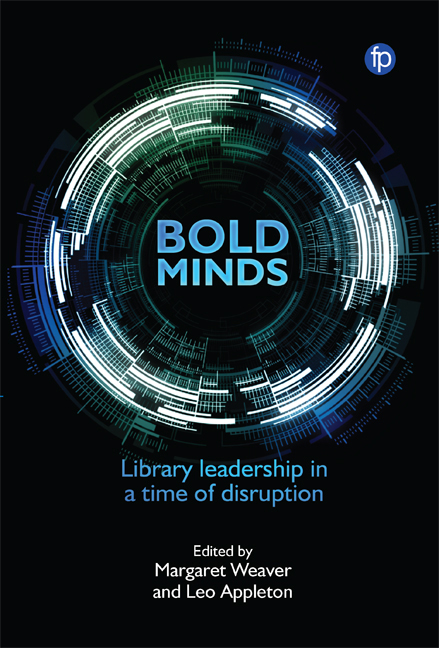Book contents
- Frontmatter
- Contents
- Foreword
- Contributors
- Preface
- Introduction
- Section 1 Views From the Corridors of Power: The Political and Global Perspective
- Section 2 The Re-Birth of Libraries – New Business Models and Re-Generation of Services
- Section 3 Who Really Matters? User Communities and Alignment
- Section 4 The Future Library Professional – Horizons and Challenges
- Index
Section 4 - The Future Library Professional – Horizons and Challenges
Published online by Cambridge University Press: 15 December 2020
- Frontmatter
- Contents
- Foreword
- Contributors
- Preface
- Introduction
- Section 1 Views From the Corridors of Power: The Political and Global Perspective
- Section 2 The Re-Birth of Libraries – New Business Models and Re-Generation of Services
- Section 3 Who Really Matters? User Communities and Alignment
- Section 4 The Future Library Professional – Horizons and Challenges
- Index
Summary
This section presents the leadership contexts of librarians working in academia, from those in practice and from the perspective of the professional educator. Authors challenge current and future librarians to rise to the challenge of digital, lead and manage upwards, work collaboratively and across non-library services, and adopt strategic data driven practices to influence at an organisational level (and beyond). These connections are first extended and critiqued by a forensic inspection of library and information science programmes preparing graduates for employment in the volatile 21stcentury information environment; analysing the extent to which curriculum is itself transformed by technological advances, artificial technology, big data and new practices inherent in the ‘fourth industrial revolution’. It is strongly argued that library work is increasingly demanding leadership of the open movement, a participatory culture and an imperative to prioritise the data revolution: in summary, calling for a radical change in behaviour, technical and social competencies.
Whilst contributors acknowledge that the skills and attributes to capitalise on these contemporary agendas are already present in many librarians and roles, the chapters question whether innovation is led sufficiently by librarians or by others and whether changes to practice go far enough, fast enough.
The section is thus concerned with the influence of the library across organisational boundaries and highlights the transferability of leadership creativity for library and business sectors. The disruption inherent in this section is ‘The library is unadventurous and has not embraced radical thinking, new librarians are poorly equipped for modern information environments, librarians are stuck in the past, and digital transformation has nothing to do with the library’. Chapter authors dispel this somewhat, but challenge whether a future direction will see library leaders at the forefront of creativity, questioning whether librarians are equipped with the necessary skills and behaviours for the complex information world.
Opportunities for leading on digital skills, data and innovation at a strategic level are clearly set out alongside attributes that will be needed in any library – sustained by bold leadership, reflective practice and flexible thinking.
- Type
- Chapter
- Information
- Bold MindsLibrary Leadership in a Time of Disruption, pp. 177 - 178Publisher: FacetPrint publication year: 2020



